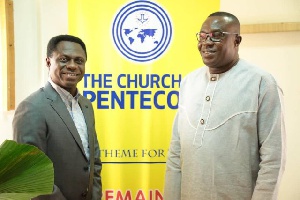 Chairman of the Church of Pentecost, Apostle Eric Nyamekye and the Hon. Samuel Ofosu -Ampofo
Chairman of the Church of Pentecost, Apostle Eric Nyamekye and the Hon. Samuel Ofosu -Ampofo
The church of Pentecost is under pressure to take a public stance on a secretly recorded leaked tape involving one of its members, Samuel Ofosu Ampofo. Read the full transcript of the secret tape here.
Of note is the call by Mr. Kwasi Boateng Adjei, the Chairman of the New Patriotic Party in New Juabeng North Constituency. According to him, Mr. Ampofo, who doubles as the Chairman of the National Democratic Congress, must be suspended by the church.
This pressure is being brought on the church at a time the security agencies are yet to commence investigations into the matter to establish the guilt or otherwise of Mr. Ampofo, who has denied the contents of the tape.
Prior to this development, the church of Pentecost was again under pressure to disown one of its members, Joseph Siaw Agyepong, CEO of the Zoomlion Ghana Limited and Chairman of the Jospong Group of Companies for alleged acts of corruption involving his businesses.
In fact, the recent partnership of the church with this man to rid the state of filth was described by one writer as partnering with an unrepentant pedophile to fight child sex abuse.
But my question is, must the church [of Pentecost] comment publicly on how its members discharge their professional obligations?
Presently the Church of Pentecost operates in 99 nations with global adult membership of 3 million and children constituting about 988,086. Is the church expected to publicly comment on whatever each of these members do whether wrong or right in the discharge of their professional obligations?
Since the church of Pentecost is not the only religious organization in Ghana, that will stand to reason that of the 28 million members of the Ghanaian society, who are religious and their leaders must occasionally account for their individual misdeeds publicly in the discharge of their various professions.
Where then will the individual, corporate leadership and family responsibility lie if our pastors must be held to account for what we do right or do not do right? Do we even hold parents to account on what their 18-year-olds do? How much more holding the deeds of an adult with five children against his church? Wow!
So, for instance, the president’s pastor must comment on the depreciation of the cedi, pastor of the waakye seller on why the food is lacking salt, the pastor of the erstwhile Minister of Tourism, Catherine Afeku, on why she was reshuffled and all those in jail by the state for one reason or the other, their pastors must explain why. Because they all go to either a church or mosque.
And assuming this was practically possible to achieve, who gave the church that authority?
Are we not the same people who labeled the building of a National Cathedral by the State as forcing religion on the people? Yet we have no problem calling on the church to dictate how people run their businesses or carry out their professional civic duties? I beg to differ.
I submit that in a democracy, the right of the church over its members is not legal and obligatory. It is a moral one. The church can interfere with the individual’s life not against their wish or detrimental to them but only to the extent that the individual permits.
One obeys the church not because they have been compelled to do so. It is because they have allowed the church’s influence over their lives.
The church cannot even use the court to secure compliance from its members. Imagine a person being taken to court for not paying their tithes on time. Sounds funny, right? Perhaps funnier if you look at the scenario of somebody calling a pastor to pronounce on how people do their business because they attend that pastor’s church.
Those forcing the church to disown others because it suits their transient political interest should note that they are giving the church powers it does not have. And when it begins to exercise the same, nobody should complain.
I will now discuss the relationship between the pastor and his church members. It is care and love.
The relationship between the church and its members can loosely be described as those between a doctor and his patient, a lawyer and her client and maybe mother and her baby. It is strictly confidential and fatherly (if you like, motherly). Very protective.
They have all sworn an oath of confidentiality with the subjects who come to them to protect them from their failings.
By these arrangements, people submit their souls and even their very secrets to these persons of great integrity, knowing that they can protect them better than themselves. Who would go to church if they were adequate in themselves?
Why then should a pastor openly disown a church member it has sworn to love despite their sins and failings?
Even a medical doctor, licensed by the state to protect lives, cannot disclose the health status of a husband to his wife, without the former’s permission even if it threatens the latter’s life.
Lawyers like the Catholic priest may just go to the grave with several confessions from their clients [members] rather than use it against them in court.
How many of us will honestly stand in the dock against our own children? And why should the church of Pentecost be any different?
Jesus did not cast away the adulterous woman. He said those without sins should cast the first stone.